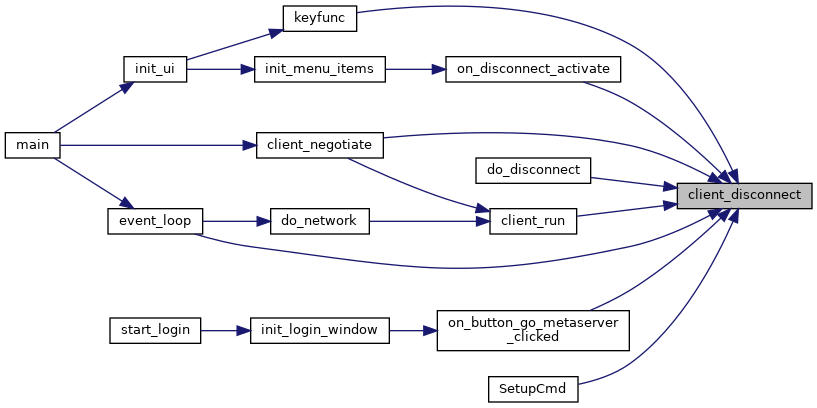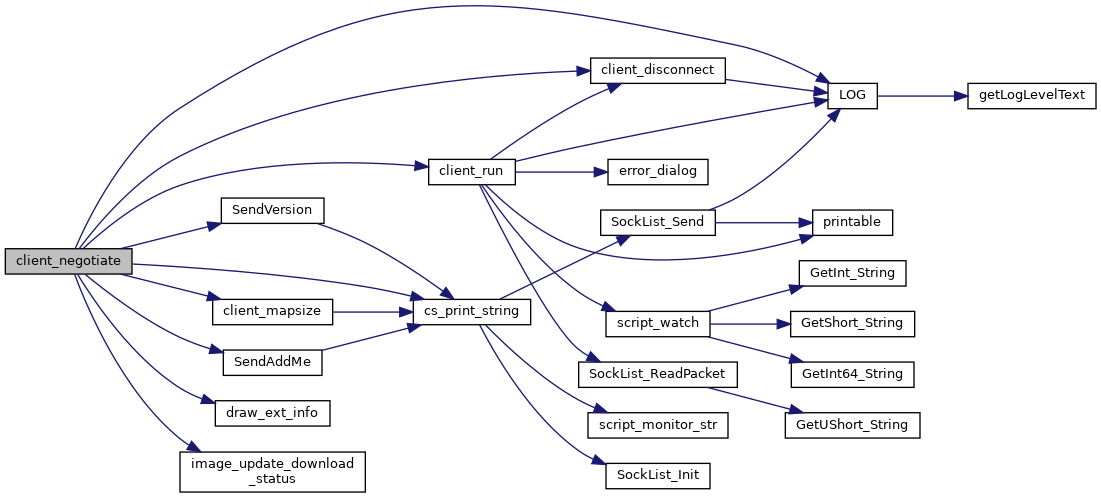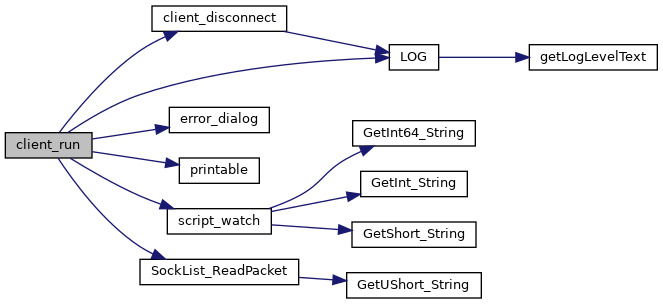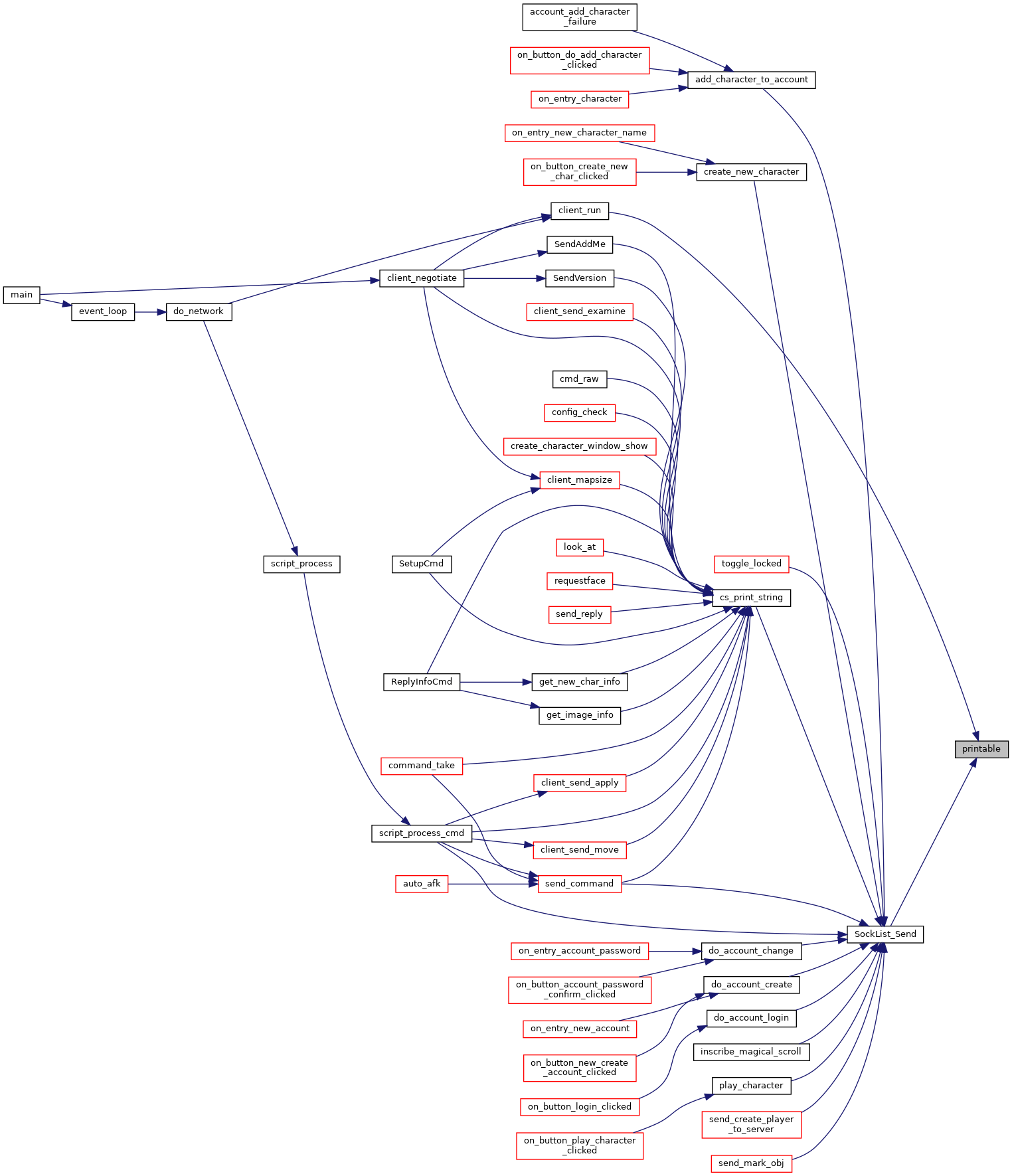#include "client.h"#include <ctype.h>#include <errno.h>#include <gio/gio.h>#include "external.h"#include "mapdata.h"#include "metaserver.h"#include "script.h"
Go to the source code of this file.
Classes | |
| struct | CmdMapping |
Macros | |
| #define | NCOMMANDS ((int)(sizeof(commands)/sizeof(struct CmdMapping))) |
Typedefs | |
| typedef void(* | CmdProc) (unsigned char *, int len) |
Functions | |
| void | client_connect (const char hostname[static 1]) |
| void | client_disconnect () |
| GQuark | client_error_quark () |
| GSource * | client_get_source () |
| bool | client_is_connected () |
| void | client_mapsize (int width, int height) |
| void | client_negotiate (int sound) |
| void | client_run () |
| char * | printable (void *data, int len) |
Variables | |
| const char * | cache_dir |
| struct CmdMapping | commands [] |
| const char * | config_dir |
| Client_Player | cpl |
| ClientSocket | csocket |
| guint64 * | exp_table =NULL |
| guint16 | exp_table_max =0 |
| static GInputStream * | in |
| int | last_used_skills [MAX_SKILL+1] |
| int | maxfd |
| int | replyinfo_last_face = 0 |
| int | replyinfo_status = 0 |
| int | requestinfo_sent = 0 |
| NameMapping | resist_mapping [NUM_RESISTS] |
| const char *const | resists_name [NUM_RESISTS] |
| int | serverloginmethod = 0 |
| NameMapping | skill_mapping [MAX_SKILL] |
| char * | skill_names [MAX_SKILL] |
| char * | sound_server = BINDIR "/cfsndserv" |
| char | VERSION_INFO [MAX_BUF] |
| int | want_skill_exp = 0 |
| int | wantloginmethod = 2 |
Detailed Description
Client interface main routine. Sets up a few global variables, connects to the server, tells it what kind of pictures it wants, adds the client and enters the main dispatch loop.
The main event loop (event_loop()) checks the TCP socket for input and then polls for x events. This should be fixed since you can just block on both filedescriptors.
The DoClient function receives a message (an ArgList), unpacks it, and in a slow for loop dispatches the command to the right function through the commands table. ArgLists are essentially like RPC things, only they don't require going through RPCgen, and it's easy to get variable length lists. They are just lists of longs, strings, characters, and byte arrays that can be converted to a machine independent format
Definition in file client.c.
Macro Definition Documentation
◆ NCOMMANDS
| #define NCOMMANDS ((int)(sizeof(commands)/sizeof(struct CmdMapping))) |
Typedef Documentation
◆ CmdProc
Function Documentation
◆ client_connect()
| void client_connect | ( | const char | hostname[static 1] | ) |
Definition at line 289 of file client.c.
References CONFIG_FASTTCP, CONFIG_PORT, csocket, ClientSocket::fd, in, ClientSocket::servername, SOL_TCP, and use_config.
Referenced by main(), and metaserver_connect_to().

◆ client_disconnect()
| void client_disconnect | ( | void | ) |
Closes the connection to the server. It seems better to have it one place here than the same logic sprinkled about in half a dozen locations. It is also useful in that if this logic does change, there is just one place to update it.
Definition at line 175 of file client.c.
References csocket, ClientSocket::fd, LOG(), and LOG_DEBUG.
Referenced by client_negotiate(), client_run(), do_disconnect(), event_loop(), keyfunc(), on_button_go_metaserver_clicked(), on_disconnect_activate(), and SetupCmd().


◆ client_error_quark()
◆ client_get_source()
| GSource* client_get_source | ( | void | ) |
Return a source triggered when input from the server is available.
Definition at line 324 of file client.c.
References in.
Referenced by event_loop().

◆ client_is_connected()
| bool client_is_connected | ( | ) |
Definition at line 320 of file client.c.
References csocket, and ClientSocket::fd.
Referenced by do_network(), on_disconnect_activate(), and redraw().

◆ client_mapsize()
| void client_mapsize | ( | int | width, |
| int | height | ||
| ) |
Ask the server for the given map size.
Definition at line 171 of file client.c.
References cs_print_string(), csocket, ClientSocket::fd, height, and width.
Referenced by client_negotiate(), map_check_resize(), and SetupCmd().


◆ client_negotiate()
| void client_negotiate | ( | int | sound | ) |
This function negotiates the characteriistics of a connection to the server. Negotiation consists of asking the server for commands it wants, and checking protocol version for compatibility. Serious incompatibilities abort the connection.
- Parameters
-
sound Non-zero to ask for sound and music commands.
Definition at line 329 of file client.c.
References Face_Information_struct::cache_hits, Face_Information_struct::cache_misses, client_disconnect(), client_mapsize(), client_run(), CONFIG_CACHE, CONFIG_DOWNLOAD, CONFIG_LIGHTING, CONFIG_MAPHEIGHT, CONFIG_MAPWIDTH, CONFIG_SMOOTH, cs_print_string(), ClientSocket::cs_version, csocket, draw_ext_info(), face_info, Face_Information_struct::faceset, ClientSocket::fd, image_update_download_status(), LOG(), LOG_ERROR, LOG_WARNING, MAX_BUF, MSG_TYPE_CLIENT, MSG_TYPE_CLIENT_CONFIG, NDI_GOLD, Face_Information_struct::num_images, replyinfo_last_face, replyinfo_status, requestinfo_sent, RI_IMAGE_INFO, RI_IMAGE_SUMS, ClientSocket::sc_version, SendAddMe(), SendVersion(), serverloginmethod, use_config, want_config, Face_Information_struct::want_faceset, and wantloginmethod.
Referenced by main().


◆ client_run()
| void client_run | ( | void | ) |
Read available packets from the server and handle commands until there are no more, or if a socket error occurs.
Definition at line 202 of file client.c.
References SockList::buf, client_disconnect(), CmdMapping::cmdformat, CmdMapping::cmdname, CmdMapping::cmdproc, commands, csocket, debug_protocol, error_dialog(), ClientSocket::fd, SockList::len, LOG(), LOG_ERROR, LOG_INFO, MAXSOCKBUF, NCOMMANDS, printable(), script_watch(), and SockList_ReadPacket().
Referenced by client_negotiate(), and do_network().


◆ printable()
| char* printable | ( | void * | data, |
| int | len | ||
| ) |
Replace the non-printable characters in 'data' with a dot ('.') in a newly allocated, NUL-terminated string. Caller must free the result.
Definition at line 186 of file client.c.
Referenced by client_run(), and SockList_Send().

Variable Documentation
◆ cache_dir
| const char* cache_dir |
Definition at line 53 of file client.c.
Referenced by cache_newpng(), finish_face_cmd(), init_common_cache_data(), and init_paths().
◆ commands
| struct CmdMapping commands[] |
The list of server commands that this client supports along with pointers to the function that handles the command. The table also gives a rough indication of the type of data that the server should send with each command. If the client receives a command not listed in the table, a complaint is output on stdout.
Definition at line 101 of file client.c.
Referenced by client_run().
◆ config_dir
| const char* config_dir |
Definition at line 52 of file client.c.
Referenced by config_load(), init_paths(), init_theme(), keybindings_init(), load_msgctrl_configuration(), save_keys(), and save_msgctrl_configuration().
◆ cpl
| Client_Player cpl |
Player object.
Definition at line 69 of file client.c.
Referenced by AddspellCmd(), animate_objects(), bind_key(), client_init(), client_tick(), command_take(), configure_keys(), DeleteSpell(), do_inv(), draw_inv(), draw_inv_list(), draw_inv_table(), draw_lists(), draw_look_list(), draw_magic_map(), draw_message_window(), draw_stats(), drawingarea_inventory_table_expose_event(), extended_command(), fire_dir(), focusoutfunc(), get_item_env(), gtk_command_history(), handle_query(), hide_main_client(), item_actions(), item_event_item_deleting(), keybindings_init(), keyfunc(), list_item_drop(), load_theme(), locate_item(), magic_map_flash_pos(), MagicMapCmd(), main(), metaserver_connect_to(), metaserver_show_prompt(), new_player(), on_count_changed(), on_entry_commands_activate(), on_switch_page(), parse_key(), parse_key_release(), redraw(), remove_item(), reset_player_data(), reset_vars_common(), save_keys(), script_init(), script_process_cmd(), send_command(), send_reply(), show_item_menu(), StatsCmd(), stop_fire(), toggle_keybind_scope(), update_skill_information(), update_spell_information(), UpdspellCmd(), and x_set_echo().
◆ csocket
| ClientSocket csocket |
Definition at line 70 of file client.c.
Referenced by add_character_to_account(), client_connect(), client_disconnect(), client_is_connected(), client_mapsize(), client_negotiate(), client_run(), client_send_apply(), client_send_examine(), client_send_move(), cmd_raw(), command_take(), CompleteCmd(), config_check(), create_character_window_show(), create_new_character(), do_account_change(), do_account_create(), do_account_login(), draw_stats(), get_image_info(), get_new_char_info(), inscribe_magical_scroll(), keybindings_init(), keyfunc(), look_at(), main(), map_check_resize(), mapdata_newmap(), metaserver_connect_to(), play_character(), ReplyInfoCmd(), requestface(), reset_vars_common(), save_keys(), script_init(), script_process_cmd(), send_command(), send_create_player_to_server(), send_mark_obj(), send_reply(), set_item_values(), SetupCmd(), SockList_ReadPacket(), toggle_locked(), and VersionCmd().
◆ exp_table
| guint64* exp_table =NULL |
Definition at line 65 of file client.c.
Referenced by client_init(), draw_message_window(), get_exp_info(), and update_skill_information().
◆ exp_table_max
| guint16 exp_table_max =0 |
Definition at line 64 of file client.c.
Referenced by client_init(), draw_message_window(), get_exp_info(), and update_skill_information().
◆ in
|
static |
Definition at line 71 of file client.c.
Referenced by client_connect(), client_get_source(), init_default_keybindings(), keybindings_init(), parse_keys_file(), and SockList_ReadPacket().
◆ last_used_skills
| int last_used_skills[MAX_SKILL+1] |
maps position to skill id with trailing zero as stop mark.
Definition at line 55 of file client.c.
Referenced by client_init(), and use_skill().
◆ maxfd
| int maxfd |
Definition at line 58 of file client.c.
Referenced by do_network(), and script_fdset().
◆ replyinfo_last_face
| int replyinfo_last_face = 0 |
Definition at line 58 of file client.c.
Referenced by client_negotiate(), and get_image_sums().
◆ replyinfo_status
| int replyinfo_status = 0 |
Definition at line 57 of file client.c.
Referenced by client_negotiate(), and get_image_info().
◆ requestinfo_sent
| int requestinfo_sent = 0 |
Definition at line 57 of file client.c.
Referenced by client_negotiate().
◆ resist_mapping
| NameMapping resist_mapping[NUM_RESISTS] |
Definition at line 67 of file client.c.
Referenced by draw_stats(), and update_stat_mapping().
◆ resists_name
| const char* const resists_name[NUM_RESISTS] |
Definition at line 73 of file client.c.
Referenced by update_stat_mapping().
◆ serverloginmethod
| int serverloginmethod = 0 |
Definition at line 62 of file client.c.
Referenced by client_negotiate(), client_reset(), main(), on_button_create_character_clicked(), and start_login().
◆ skill_mapping
| NameMapping skill_mapping[MAX_SKILL] |
Definition at line 67 of file client.c.
Referenced by draw_stats(), update_skill_information(), and update_stat_mapping().
◆ skill_names
| char* skill_names[MAX_SKILL] |
Definition at line 50 of file client.c.
Referenced by AddspellCmd(), client_init(), client_reset(), draw_stats(), get_skill_info(), script_process_cmd(), and update_stat_mapping().
◆ sound_server
◆ VERSION_INFO
| char VERSION_INFO[MAX_BUF] |
Definition at line 48 of file client.c.
Referenced by main(), parse_args(), and SendVersion().
◆ want_skill_exp
◆ wantloginmethod
| int wantloginmethod = 2 |
Definition at line 61 of file client.c.
Referenced by client_negotiate().
 1.8.17
1.8.17